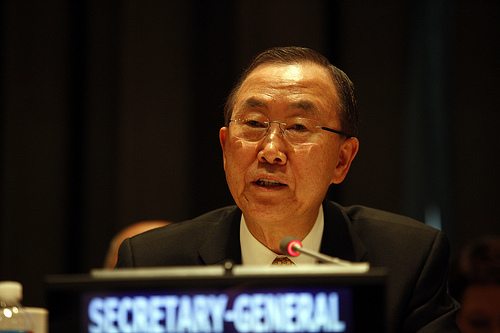

Environment
Ban Ki-moon: climate change security threat same as ‘armed group bent on plunder’
Leading figures in the United Nations have warned the strategic community that climate change is one of the most urgent threats to international security.
Speaking at the 50th Munich Security Conference this weekend, UN secretary-general Ban Ki-moon warned, “Climate change is every much a security threat as an armed group bent on plunder.”
Christiana Figueres, the executive secretary of the UN Framework Convention on Climate Change (UNFCCC) explained that changes to the environment represent a “systemic risk” to security because of the displacement it can cause.
“Currently we have about 200 million people displaced in the world. We don’t have any clear data on how that displacement will grow with climate change because that data is still being developed”, she said.
“But the range of estimates go anywhere from 25 million to an extra one billion displaced by 2050, if we have runaway climate change. And its not surprising, because the very clear estimates are that 5 billion people will be living in water stressed areas. So having one billion of that displaced is probably not an exaggeration.”
Figueres also warned that military operations themselves would be threatened because of the “life support dependence” forces have on increasingly budgeted and costly fossil fuels.
Pointing out the scale of the issue, Figueres noted, “One gallon of fuel will move a UK aircraft carrier 12 inches.”
In his keynote speech at the Bayerischer Hof Hotel, US secretary of state John Kerry listed climate change among “the great tests of our time”.
“I urge you, read the latest [Intergovernmental Panel on Climate Change] report. It’s really chilling. And what’s chilling is not rhetoric; it’s the scientific facts, scientific facts”, he told delegates.
UN secretary-general Ban has warned of the security implications of climate change before. In 2011, he told the UN Security Council that the impact of extreme weather and rising seas on lives, and national infrastructures and budgets – a “unholy brew” – could create dangerous security vacuums.
“The facts are clear: climate change is real and accelerating in a dangerous manner,” he said at the time, declaring that it “not only exacerbates threats to international peace and security; it is a threat to international peace and security”.
In 2013 the commander of the US forces in the Pacific, Navy Admiral Samuel J. Locklear III, also said upheaval caused by global warming “is probably the most likely thing that is going to happen […] that will cripple the security environment, probably more likely than the other scenarios we all often talk about.”
He added, “We have interjected into our multilateral dialogue – even with China and India – the imperative to kind of get military capabilities aligned [for] when the effects of climate change start to impact these massive populations.
“If it goes bad, you could have hundreds of thousands or millions of people displaced and then security will start to crumble pretty quickly.’’
Further reading:
‘This is the year to fight climate change’, World Bank president tells finance world at Davos
UN secretary-general Ban Ki-moon appoints two climate envoys
Climate change may have contributed to Syrian civil war
Global warming will put over 600 million people at risk of higher water scarcity
Climate change will devastate developing world, says World Bank


 Environment12 months ago
Environment12 months agoAre Polymer Banknotes: an Eco-Friendly Trend or a Groundswell?

 Features11 months ago
Features11 months agoEco-Friendly Cryptocurrencies: Sustainable Investment Choices

 Features12 months ago
Features12 months agoEco-Friendly Crypto Traders Must Find the Right Exchange

 Energy11 months ago
Energy11 months agoThe Growing Role of Solar Panels in Ireland’s Energy Future





























